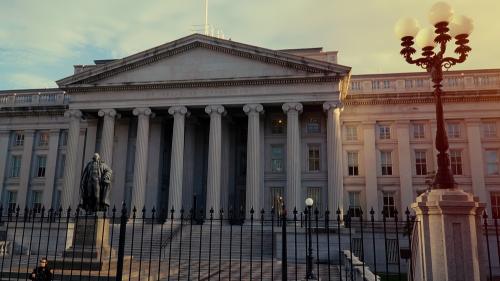Now we have one more thing for which to blame Goldman Sachs. Their latest public relations problem — a very public denunciation of their culture by a departing mid-level investment banker — has given added impetus to supporters of the Volcker Rule, the part of the Dodd-Frank financial reform law intended to force banks out of “proprietary trading.” (The activities which were denounced are not covered by the Volcker Rule, but this does not stop politicians from drawing spurious connections, taking advantage of Goldman’s terrible public image.) While I am a strong supporter of Dodd-Frank, this part of the law is fundamentally flawed and will do considerably more harm than good for the economy.
The core problem is the Volcker Rule purports to eliminate excessive investment risk at banks without measuring either the level of risk or the capacity of banks to handle it, which would tell us whether the risk was excessive. Instead, the rule focuses on the intent of the investment. This subjective and vague approach means the Volcker Rule will do a poor job of identifying or eliminating excessive investment risk, will be costly even when it correctly identifies risk, and will be even more costly when it discourages risk that is incorrectly treated as if it were excessive.
The Volcker Rule will raise the cost of credit to our suffering economy. Securities markets will be harmed by a substantial reduction in the liquidity currently provided by banks. This will force a widening of bid/ask spreads, equivalent to increasing commissions charged to investors, and will also make new issuances of securities more expensive. It will also raise costs and lower revenues for banks, pushing them to charge customers more in other ways.
As a result, companies wishing to invest in new plants or R&D or to hire additional workers will face a higher cost of funds. The decreased efficiency of markets will also spur investors to demand higher risk premiums, reducing the value of existing stocks, bonds, and other assets, potentially including housing.
The Volcker Rule has at least four core problems. First, there is the question of relevance. It is unclear why we should care very much about a bank’s intent. It’s the level of risk relative to the capacity to bear that risk which is of prime interest. The globally-agreed rules on bank capital requirements take a more intelligent approach, by explicitly measuring both investment risk and the adequacy of capital to absorb those risks. One can validly argue about the specifics, but it makes a lot more sense to fix any flaws in that approach than to act as if we have no ability to measure risk or capital.
Second, the concept of “proprietary investments” is a very subjective and arbitrary one. Many supporters of the rule seem to be particularly concerned about investments made by banks which are funded with depositor money and on which the shareholders collect any gain. However, that defines essentially any investment made by a bank, since depositor funds are basically interchangeable with all the other funds gathered by a bank and the shareholders always benefit from any gains on investments. I therefore surmise the underlying rationale for the rule must be to try to separate out activities that are integral to banking from those that are not. By focusing on investments alone, the Volcker Rule implicitly assumes that lending is good. In addition, some investment activities are recognized as integral to banking, while others are not.
This raises several concerns. First, I do not always agree with the arbitrary choices about what is integral and what is not. More importantly, it is often extremely hard to draw the line between acceptable and unacceptable activities. For instance, securities dealing requires the holding of securities to meet potential customer demand in a timely manner. At what point does the inventory shift from being an appropriate size to being at a level which indicates speculation of a type the Volcker Rule prohibits?
Perhaps more fundamentally, finance has evolved over the last few decades to the point where corporate borrowers switch easily between borrowing via loans and via securities. This means that securities activities are now integral to modern banking, just as lending has always been. Treating loans as good and securities transactions as suspect, which is implicit in the Volcker Rule, leads to bad policy.
Third, operationalizing the arbitrary and subjective distinctions created by the Volcker Rule forces regulators to peer into the hearts of bankers. The proposed rules are inevitably very complex, as regulators make an honest effort to obtain enough information to guess the intent behind investment actions. We are in danger of forcing regulators to micromanage the actions banks take in one of their core activities, the ownership and trading of securities. This raises costs and discourages legitimate activities.
Fourth, by focusing on intent, we are almost certain to miss large swathes of investments that are taken on for an acceptable purpose, but which carry excessive risk. Almost all of the “AAA” mortgage-backed and asset-backed securities on which banks lost money in the financial crisis would have passed the Volcker Rule tests easily.
We will survive the Volcker Rule, but it is an unnecessary, self-inflicted wound. Congress should repeal it. Failing that, Congress should clearly instruct regulators to stop only those activities that very clearly violate the Volcker Rule without halting activities where the intent of the transactions is unclear. Regulators should also be encouraged to implement the rule in the least burdensome manner possible. Nonetheless, the arbitrariness of this rule and the ambiguity of definitions necessarily produces excessive complexity.
The Brookings Institution is committed to quality, independence, and impact.
We are supported by a diverse array of funders. In line with our values and policies, each Brookings publication represents the sole views of its author(s).



Commentary
Op-edThe Volcker Rule Is Still a Bad Idea
March 19, 2012